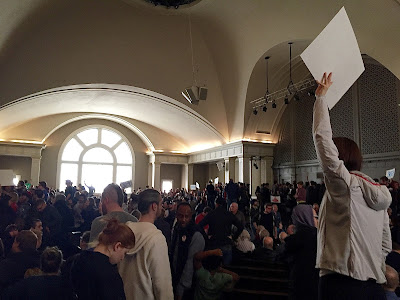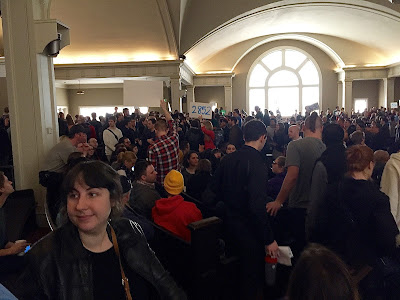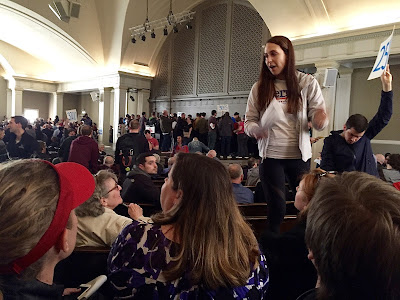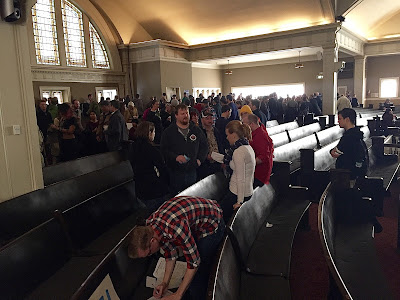On Saturday, I caucused for Bernie Sanders. I'm a Democrat, in no small measure because I want to be part of this process. I have nothing against Hillary Clinton. Indeed, I will not just vote for her if she is the nominee, but I will work for her, if only because I have a lot to dislike, even fear, about the Republican frontrunners for president. I'm not interested in debating the merits of my position on the primary because it's too late, I've already cast my vote and am now just waiting for the rest of my fellow citizens to cast theirs.
What I do want to write about is the process of caucusing versus mere voting. A few years back, our state went to all mail-in voting. I like the convenience of it, but I do miss the ritual of showing up at my polling place, of standing in line with my neighbors, of feeling like I'm more than just an oval darkening cog in a machine. Fortunately, the Democrats in Washington state are still caucusing. This is my tenth presidential election as a voter, and my third time caucusing.
I showed up at my Town Hall caucus location at 9 a.m., an hour early. It was a gorgeous, cool, and sunny day, but even if it had been pouring rain, I'd have walked given that it was less than a mile from home. The closer I got, the more I became aware that that people around me, the every day folks walking along with me, were all heading out to do the same thing, to do democracy together, to engage in the process of self-governance.
I filled out my form, identifying myself and my preference (there is no secret ballot at a caucus), then found a seat in the mezzanine where I finished my coffee. A young man asked to share my table, a guy who was not much older than my daughter, a student aspiring to be a transportation engineer like my dad. We immediately fell into a conversation about the future of our country. We were interrupted several times by candidates for office -- not their representatives, but actual candidates running for the state senate or other offices. We paused our dialog to listen, ask questions, and share our own thoughts on what they said. Then, when they left, we went back to our discussion.

As time drew neigh, we went our separate ways. By now the building was packed, hot and humid from all those bodies. The natural bottlenecks were bottlenecking, but I made my way into the auditorium where I took a seat near the stage. The room filled. We raised hands to indicate that we had an empty seat next to us. We were told that turnout had exceeded capacity; people were waiting in the lobby and even outside. I cheered this announcement along with the rest of my neighbors.
The next step was to break off into our various precincts and get to caucusing. An earnest young woman in a Bernie! t-shirt volunteered to stand on stage and hold the sign with our precinct number. We were to gather around her and from there decide if we were going to stay in the auditorium, go downstairs, or even go outdoors to engage in our neighborhood discussion about who should represent us as president. This young woman, by silent consensus, was allowed to assume the role of captain, which basically meant she read the rules aloud and collected, counted, and reported our handwritten "ballots." Her voice wasn't strong, sadly, and we strained to hear her over the cacophony of the room. We asked her to speak up, politely, and she willingly repeated herself when requested. It was not a clean, crisp process, but rather one full of humanity and in the end I'm confident the 30 of us understood the rules.

There was plenty of time to just talk with those sitting or standing nearest. I met several people who live in my building. I had a nice talk with a retired Hillary supporter who had been an early childhood educator: we agreed about everything, except who should be our next president. I talked self governance with a woman with the surname Cherry-Garcia, a Sanders supporter, who is currently a preschool teacher (at least 10 percent of my precinct representatives were educators!). A couple of us were lawyers, a few worked in technology, several were retired. I have no idea if we were representative of our precinct, but we were serving as its representatives by virtue of having shown up.
Some people (okay, a lot of people) don't like the caucus system, but I do. I never feel more connected to democracy, to self-governing with my neighbors, than I do when I caucus. Like I said, this is my third one and I've always come away inspired. Yes, I know that my feelings aren't a good argument for retaining a system that actually engages fewer people and probably excludes some by virtue of their not being able to physically make it (one may, in fact, make one's preference known in absentia, but the cut off for doing this is a week or so prior which means that it's not possible to do it at the last minute). That said, it's a lot harder feel connected to self-governance while darkening little ovals on a mail-in ballot, which is, I think, the power of the caucus.

I came away feeling proud of myself and my neighbors. Only one of us arrived as an "undecided," a guy who I do know from my building. Some of us spoke on behalf of our candidates. The man who would ultimately serve us as a Sanders delegate to the district caucus prefaced his remarks with a story about how Hillary Clinton had single-handedly saved an important hospital in his hometown in New York, before explaining that he had found in Sanders a candidate who spoke for him. A young man with a lot of energy followed that with a fact-filled support of Clinton, followed by a caveat that he would support Bernie Sanders should he be the nominee. Our undecided neighbor asked each of the first two speakers pointed questions, which they answered with the help of the rest of us. There was a slightly tense moment when a Clinton supporter took umbrage at something a Sanders supporter asserted about her candidate, but we all agreed that we should be talking about how good our candidates are, not how bad the other guy is.
I've written a lot about democracy on this blog and that's because fostering in children the knowledge and skills necessary for self-governance is my highest priority as a teacher. I'm proud that at least a half dozen Woodland Park parents were elected to represent our Sanders votes as a delegate. It would be a sad day should the Democratic party in my state give up on the caucus system, I think. We need more democracy, not less.

The caucus promotes this sort of essential democracy, this neighborly discussion about the issues of the day. For all it's flaws, the caucus bears within it the seeds of what I call
"deep democracy." It brings us out from behind our isolating screens where the world of politics is presented as bare knuckled brawling or mind-numbing wonkiness or self-satisfied professional politicians seeking to lead rather than represent. The caucus, on the other hand, is we the people, doing the people's business, together, with the civility that comes from recognizing that we're all in this together.
I put a lot of time and effort into this blog. If you'd like to support me please consider a small contribution to the cause. Thank you!
No comments:
Post a Comment